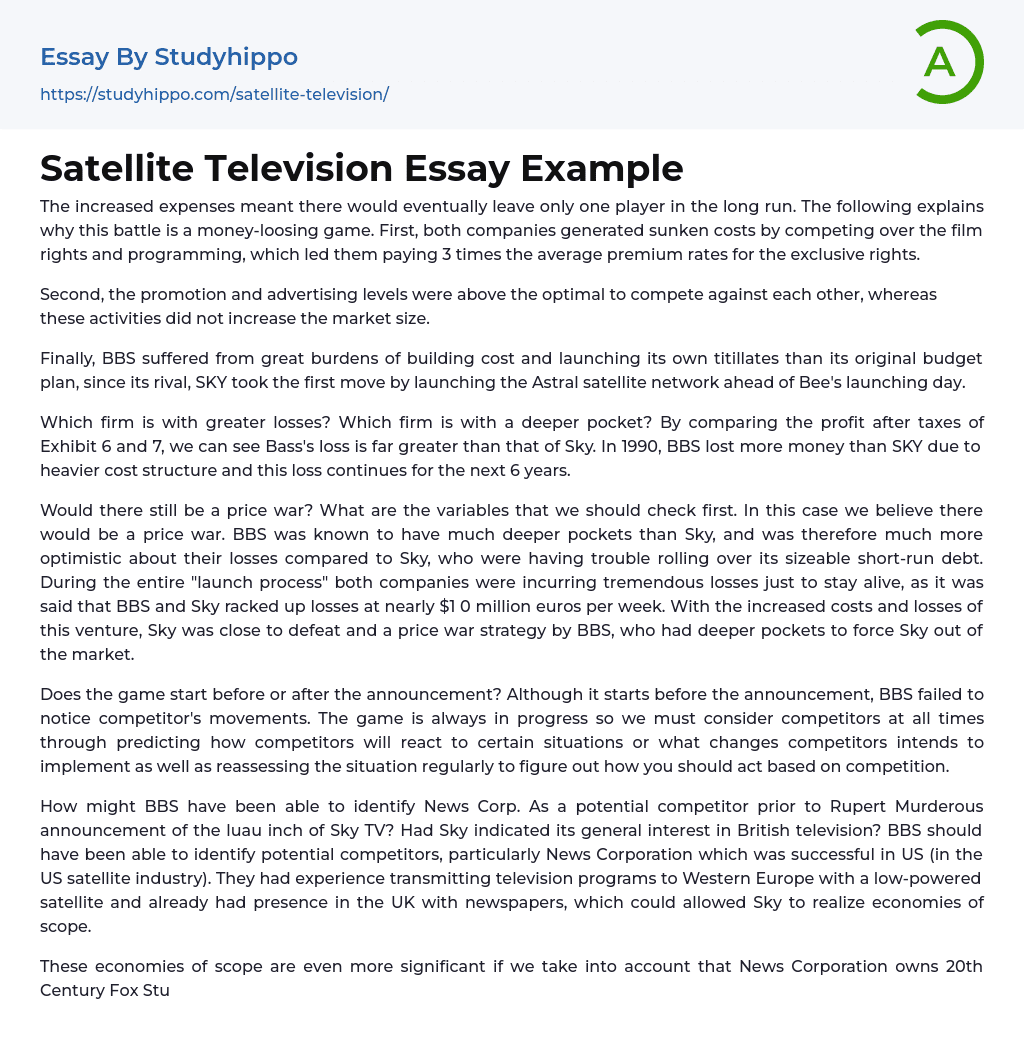Due to increased expenses, there would eventually only be one player left in the long run. This is because the battle for film rights and programming between the two companies resulted in them paying 3 times the average premium rates, generating sunken costs and making it a money-losing game.
In the end, BBS encountered significant expenses related to constructing and releasing its own broadcasts, which exceeded its initial budgetary plan. This was due to SKY's preemptive launch of the Astral satellite network before BBS had a chance to release its own.
To determine which company has suffered greater losses and has deeper pockets, we can analyze the profit after taxes shown in Exhibits 6 and 7. It is evident that Bass has experienced significantly greater losses than Sky. In 1990, BBS incurred a heavier cost s
...tructure resulting in more substantial losses compared to SKY, which continued for the following six years.
The question of whether a price war would occur hinges on several variables. Taking this specific case into consideration, it is believed that a price war would indeed occur. BBS had more financial resources compared to Sky, so they were more optimistic about their losses. Meanwhile, Sky was having difficulties in managing its sizable short-term debt and was in danger of being defeated. Both companies suffered significant losses during the "launch process", with BBS and Sky incurring losses of nearly 10 million euros per week. Due to the escalating costs and losses, BBS had the advantage and could potentially force Sky out of the market with a price war strategy.
Prior to the announcement, the game commences but BBS overlooks
competitor strategies. It is crucial to continually anticipate rival reactions, projected modifications, and regularly re-evaluate the scenario to determine the best course of action.
BBS could have identified News Corp. as a potential competitor before Rupert Murdoch's announcement about the launch of Sky TV. One way to do this would be to consider Sky's interest in British television and the successful track record of News Corporation in the US satellite industry. News Corp. had already transmitted TV programs to Western Europe with a low-powered satellite and had a presence in the UK through newspapers, which could have given Sky the advantage of economies of scope.
The economies of scope are magnified by the fact that News Corporation possesses 20th Century Fox Studios, which acquired a 69% stake in SAT and rebranded it as Sky Channel, indicating a possible rival for BBS. Furthermore, the aggressive and high-stakes nature of Murderous personality, who competed against BBS for the British DB's franchise and lost, suggests he will persist despite setbacks.
Morocco has an interest in becoming the leading player for advertising revenue in the UK, as it is one of the world's wealthier nations. News Corporation, a global company, poses a significant threat as a clear rival, and BBS should acknowledge their intentions or the potential threat to their credibility in competition.
It was necessary for BBS to identify potential competitors in 1990. Particularly, they should have paid attention to News Corporation, which had achieved success in the U.S. satellite TV industry, had experience in the European market, and already had a foothold in the U.K. through ownership of newspapers.
Instead of spending 900 million on
investments and advertising, BBS should have focused on ensuring that they had the necessary equipment to sell by investing in or cooperating with their equipment supplier. They should have also prioritized the faster development of the ITT chip to meet the expected launch date. Although the merger with Bosky appeared to be a 50-50 split, BBS deserved more than 50% share (at least 60%) and greater control over the company due to their significant investment and advertising spending. Furthermore, considering their GAP loss of over 800 million, BBS should have gained over half of direct control of the company.
- Sales Promotion essays
- Advertising campaign essays
- Money essays
- Financial Accounting essays
- Market Segmentation essays
- Supply And Demand essays
- Purchasing essays
- Forecasting essays
- Legacy essays
- Bank essays
- Corporate Finance essays
- Financial News essays
- Financial Ratios essays
- Financial Services essays
- Free Market essays
- Shareholder essays
- Personal finance essays
- Equity essays
- Financial Crisis essays
- Banking essays
- Credit Card essays
- Currency essays
- Debt essays
- Gold essays
- Loan essays
- Enron Scandal essays
- Foreign Exchange Market essays
- Investment essays
- Venture Capital essays
- Stock Market essays
- Retirement essays
- Donation essays
- Net Present Value essays
- Income Statement essays
- Commercial Bank essays
- Debit Card essays
- Deposit Account essays
- Subprime Lending essays
- Perfect Competition essays
- Underwriting essays
- Synergy essays
- Valuation essays
- Investing essays
- Asset essays
- Depreciation essays
- Discounted Cash Flow essays
- Foreign Direct Investment essays
- Funds essays
- Internal Rate Of Return essays
- Revenue essays




